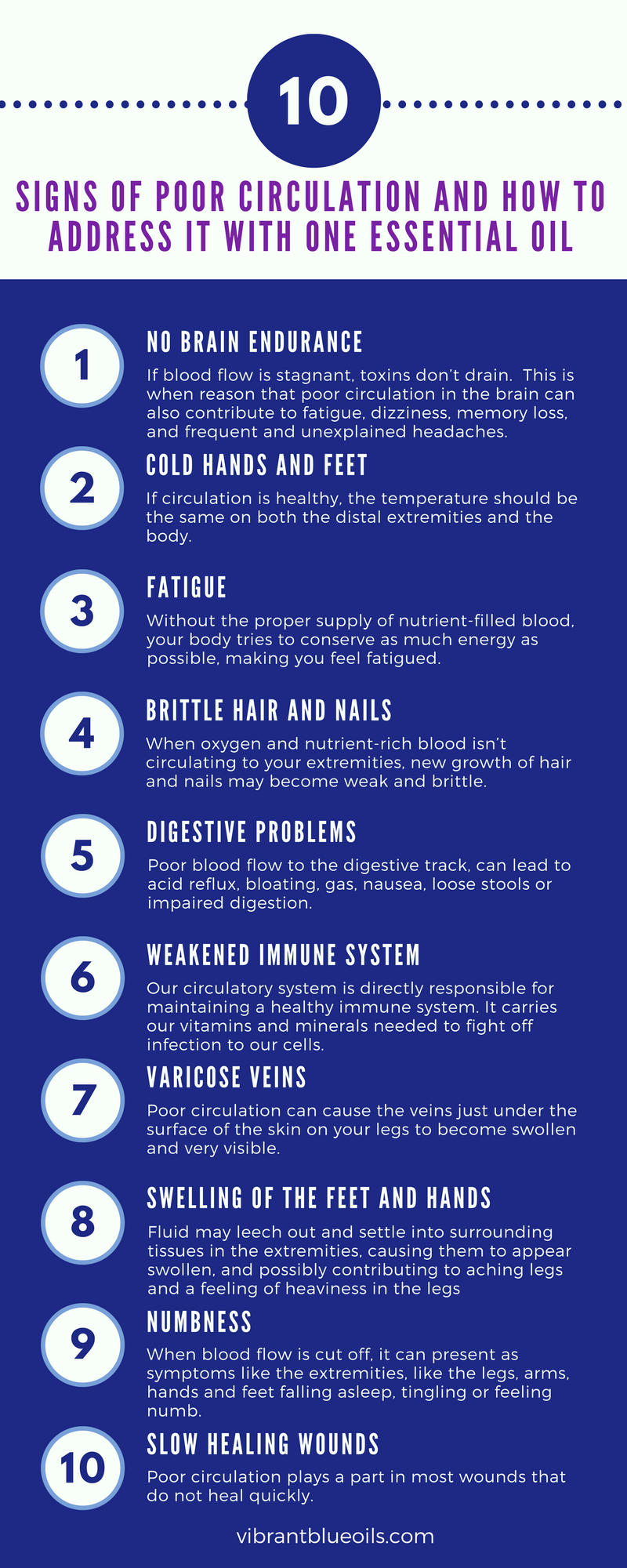Do you need to wear socks to bed? Or notice occasional memory lapses or brain fog? Perhaps you’ve noticed varicose veins or tingling in your hands or feet. All of these can be signs of poor circulation or the lack of blood flow and nutrients to extremities, like hands, feet and brain.
As you may know, healthy circulation is critical for delivery of oxygen and nutrient rich blood to the body and the brain, while simultaneously carrying toxins and waste to the kidney and liver to be eliminated.
An easy way to assess healthy circulation is to look at the circulation of the distal extremities like the fingers, toes and brain. Also, the brain is the most vertical tissue and is consistently dealing with the forces of gravity due to its vertical position.
 Poor Circulation Signs
Poor Circulation Signs
1. No Brain Endurance: Your brain needs a healthy supply of blood in order to function properly. When blood circulation to the brain becomes sluggish, it can impact your mental abilities, including your ability to focus and concentrate. This has to do with both the poor delivery of oxygen to the brain and the poor drainage of toxins from the brain. Our lymphatic system, which detoxifies the brain while we sleep (Learn how to Detoxify the Brain with Essential Oils HERE), piggybacks on the circulatory system. If blood flow is stagnant, toxins don’t drain. This is when reason that poor circulation in the brain can also contribute to fatigue, dizziness, memory loss, and frequent and unexplained headaches.
2. Cold Hands and Feet: If you have poor circulation, blood has a harder time traveling to your distal extremities, such as your fingers and toes. Blood also carries heat from your core to your extremities, any compromise the speed or quantity of blood flow will cause these parts of your body feel much colder than the rest of you. You can check this yourself by comparing the temperature of your fingers and toes to the arms and the legs or the rest of the body. If circulation is healthy, the temperature should be the same on both the distal extremities and the body.
3. Fatigue: When your circulatory system slows down, it damages it’s capacity to deliver oxygen, vitamins, and minerals throughout the body. It can also slow down your metabolism. Without the proper supply of nutrient-filled blood, your body tries to conserve as much energy as possible, making you feel fatigued.
4. Brittle Hair and Nails – When oxygen and nutrient-rich blood isn’t circulating to your extremities, new growth of hair and nails may become weak and brittle.
You might notice that your nails chip more easily or nail beds look white instead of pink. You might also notice that your hair is thinning or falls out more frequently than it used to. This is due, in part, to the fact that blood flow to the scalp is responsible for caring hormones and essential nutrients needed by the hair follicles. When circulation is compromised to the head, many individuals complain of hair falling out and thinning.
5. Digestive Problems: Adequate blood supply is necessary for nutrients to be properly digested, absorbed and assimilated. Poor blood flow to the digestive track, can lead to acid reflux, bloating, gas, nausea, loose stools or impaired digestion.
6. Weakened Immune System: Our circulatory system is directly responsible for maintaining a healthy immune system. It carries our vitamins and minerals needed to fight off infection to our cells. It also works with the immune system to remove toxins from the cells.
7. Varicose Veins: Poor circulation can cause the veins just under the surface of the skin on your legs to become swollen and very visible. These blue and purple blemishes are known as varicose veins and in addition to being somewhat unsightly, they can also become painful.
8. Swelling of the Feet and Hands: Poor circulation can result in nutrient imbalances and mess with the body’s inability to manage fluids in the body and in the blood vessels. When the circulatory system malfunctions, fluid may leech out and settle into surrounding tissues in the extremities, causing them to appear swollen, and possibly contributing to aching legs and a feeling of heaviness in the legs. Poor circulation can also cause a higher fluid density in the surface layer of fat which prevents the fat from being properly absorbed into the blood and causes it to swell with excess fluids, contributing to cellulite.
9. Numbness, loss of sensation or tingling in the hands, feet, or toes: When blood flow is cut off, it can present as symptoms like the extremities, like the legs, arms, hands and feet falling asleep, tingling or feeling numb. Muscle cramps and pain can also result.
10. Slow healing wounds: Poor circulation plays a part in most wounds that do not heal quickly. This is one reason is it a symptom of Diabetes. The excess sugar in the bloodstream can impair circulation, delaying the delivery of nutrients to wounds, both slowing the healing time and making them more prone to infection.
Essential Oils for Circulation
Essential oils can help improve circulation by relaxing the blood vessels and improving the health of the blood vessels. This helps more blood circulate through them, improving circulation in the process. Essential oils can also be used to help the veins contract, stimulating blood flow. Essential oils may also help alleviate some of the triglycerides that can form and restrict blood flow.
Essential oils can also be used to improve lymphatic system functionality which can help flush out toxins and reduce inflammation of the blood vessels, improving blood flow throughout the body.
Circulation™: Formulated to support healthy circulation to deliver oxygen and nutrient rich blood to the body and the brain, while simultaneously carrying toxins and waste to the kidney and liver to be eliminated.
Apply 2- 3 drops on the sides or back of the neck, over the left clavicle, on the wrists or ankles to support energy, brain endurance and warmth of the distal extremities, like the fingers and toes. When blood circulation to the brain becomes sluggish, it can impact your physical and mental abilities, including your ability to focus and concentrate. Poor circulation in the brain can also contribute to fatigue, vertigo, dizziness, memory loss, and frequent and unexplained headaches.
Resources
Ready to get started? Click the link below to order today:




